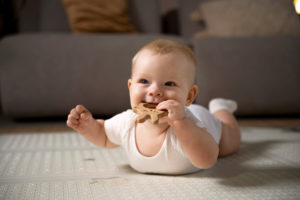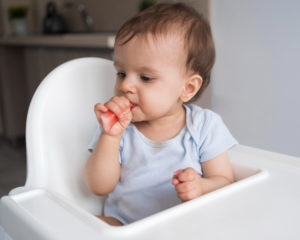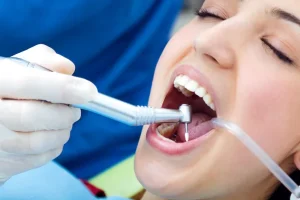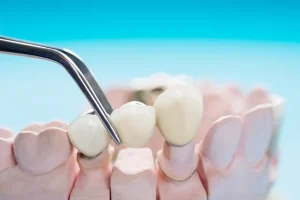The first teeth in babies emerge at around three to six months of age. The emergence of teeth from the gums is called an eruption. This condition, called baby teething, is often accompanied by mild discomfort. The eruption of teeth is frequently referred to as the cutting of the gums for tooth eruption.
A common notion about tooth eruption is that the erupting teeth cut through the gum line, but in reality, the body produces hormones that separate the gums before the tooth crown erupts.
Read on to explore the various aspects of the first tooth eruption, its symptoms, and remedies.
Table of Contents
What is Baby Teething?
For many, the question of when do babies get their first tooth may be debatable. Babies show signs of teething at around six months, and the first tooth eruption is typically accompanied by discomfort and excess drooling. This state of tooth eruption is called teething. However, some may show signs of baby teething earlier than six months. The central incisors, which are front teeth, may erupt around 6 to 10 months. The age of 13 to 16 months is when molars come in.
What are the Symptoms of Baby Teething?
The symptoms of baby teething differ for all children. While some may experience mild discomfort, others may show severe symptoms. The symptoms include:
- Tender gums, swelling, and redness
- Babies are more cranky and irritated
- There is a slight rise in temperature (up to 100°F)
- Babies want to bite on hard and cold objects as it soothes their gums
- During the teething phase, babies drool a lot. Excessive drooling can also cause rashes on the face
- While teething, babies tend to touch their mouths a lot. This can often cause infection.
- A disruption in routine and sleeping patterns is seen.
When to Consult a Dentist
While baby teething is painful, a dentist for kids or a pediatrician should be consulted immediately if the infant falls sick. Signs that your baby needs immediate medical attention during teething include:
-
- High Fever: While a mild fever can occur during teething, a high-grade fever may indicate another underlying issue that needs to be checked.
- Diarrhea and Vomiting: Diarrhea and vomiting are not caused by teething itself. They may result from babies touching their mouths repeatedly due to discomfort.
- Otitis Media (severe ear infection): Teething and severe ear infections can make your baby irritated and cranky. In the case of an ear infection, your baby may experience fluid coming from the ear, difficulty balancing while standing, and an altered response to sound and noise.
- Bleeding Gums and Oozing Pus: While teething, if you notice bleeding from the gums or pus oozing out, it is advisable to seek a professional’s opinion. This could indicate a serious gum infection and requires prompt attention from a dentist.
- Swelling in Face: Swelling in the face can result from a teething rash rather than teething itself. Excessive drool can irritate the skin on the face, leading to rash and swelling. To prevent this, keep a clean cloth or handkerchief handy to wipe away the drool.

The following kids’ teeth chart indicates when kids start losing their teeth.
| Tooth Name (Upper) | Eruption Month | Tooth Name(Lower) | Eruption Month |
| Central Incisor | 8 -12 | Central Incisor | 6 – 10 |
| Lateral Incisor | 9 – 14 | Lateral Incisor | 10 -16 |
| Canine | 16-22 | Canine | 17 – 23 |
| First Molar | 13 – 19 | First Molar | 14- 18 |
| Second Molar | 25 – 33 | Second Molar | 23-31 |
As soon as children turn six years old, you’ll notice their teeth falling out. This process continues until they turn 12, when the last primary molars fall out.
Remedies For Teething
Teething can last for a few days during tooth eruption, and the discomfort can be challenging for both the child and the parents. Some measures that can help soothe the symptoms of teething include:
- Teething Toys: These toys are designed for babies to chew on during teething. A clean, cold pacifier or a solid, cold teething toy may help soothe the gums. Teethers filled with liquids or gels should be avoided, as they can leak while babies chew on them.
- Medicine: A small dose of paracetamol or Tylenol can help reduce the pain and soreness from teething. Gels, particularly those containing benzocaine, should be avoided, as the FDA does not recommend them for children under two years of age.
- Cold Solids: If the child is eating solids or finger foods, offering slices of cold fruits and vegetables, such as apples and carrots, can help soothe sore gums.
- Cold sponging: Massaging your little one’s gums can help relieve discomfort.
- Modified Breast Feeding: Babies who nurse on breast milk may suckle longer than usual during teething. However, if sucking becomes painful, dabbing cold water on the gums before nursing can be helpful.

Conclusion
Baby teething is a natural developmental process in infants. While this phase can be uncomfortable, it is temporary and will not make the baby sick. Properly managing the discomfort can make the teething process easier for both the baby and the parents. If severe symptoms such as diarrhea, high-grade fever, or abscesses around the erupting tooth occur, parents should seek immediate medical attention. Meanwhile, soothing sore gums can be achieved using teething toys, pain relievers, and by sipping cold water at small intervals.
Consult a Dentist to Provide Your Infant With the Best Support!
The team at Anokha Dental supports parents and children during the delicate process of baby teething. Right after the first tooth erupts, our team of experienced specialists will guide you through the process.
Contact us or call at (763) 421-4002.




